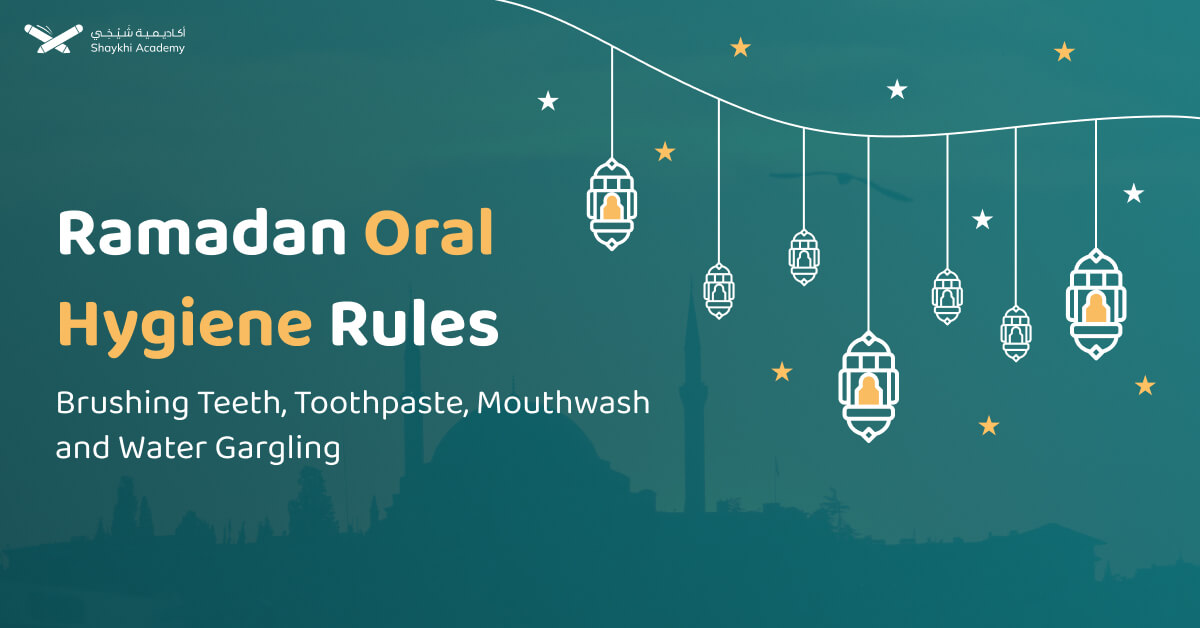Maintaining oral hygiene (such as Brushing Teeth in Ramadan) is both encouraged and permissible in Islam, with certain guidelines to be followed to ensure the validity of the fast, especially during Ramadan. During the holy month of Ramadan, Muslims worldwide observe fasting from dawn to sunset as an act of worship and spiritual practice.
While abstaining from food and drink is a fundamental aspect of fasting, many Muslims often wonder about the permissibility of certain oral hygiene practices during this time. In this article, we will delve into the guidelines regarding oral hygiene practices such as brushing teeth, using toothpaste, using miswak, using mouthwash, rinsing mouth and nose, and gargling water while fasting in Ramadan.
Defining the Concept of Oral Hygiene in Islam
Oral hygiene refers to the practice of maintaining cleanliness and health in the mouth and related structures, such as teeth, gums, and tongue. It encompasses a range of habits and routines aimed at preventing dental diseases, promoting fresh breath, and preserving overall well-being.
In Islam, the concept of cleanliness holds immense significance, encompassing not only physical purity but also spiritual and moral cleanliness. Oral hygiene, a fundamental aspect of overall cleanliness, is emphasized in Islamic teachings as it directly impacts an individual’s physical health and spiritual well-being. Oral hygiene holds significant importance in Islam, reflecting the broader emphasis on cleanliness and purity in the faith.
Maintaining oral hygiene is highly encouraged and considered a part of the overall cleanliness and purification of the body. The Prophet Muhammad (peace be upon him) emphasized the importance of oral hygiene and recommended the use of Miswak, a teeth-cleaning twig made from the Salvadora persica tree.
It was narrated from Abu Bakr that the prophet (ﷺ) said:
“The siwak is cleansing to the mouth and pleasing to the Lord”.
Sahih/Authentic
Can I Use Mouthwash During Ramadan?
Yes, you can use mouthwash during fasting hours in Ramadan. Similar to toothpaste, Islamic scholars generally agree that using mouthwash does not invalidate the fast as long as it is used in moderation and care is taken not to swallow any of it. Opting for alcohol-free mouthwash is preferable to avoid any doubt regarding its ingredients.
Can I Brush My Teeth While Fasting in Ramadan?
Yes, you can brush your teeth while fasting in Ramadan. According to Islamic scholars, it is permissible to brush teeth with a toothbrush and water (not drinking water) while fasting in Ramadan. However, one must be cautious not to swallow any water or toothpaste during the process. This practice aims to maintain oral hygiene without compromising the validity of the fast
To avoid any potential issues while fasting, it is advisable to use a dry toothbrush or one moistened with water only. This ensures that no substances are ingested, thereby preserving the integrity of the fast. Additionally, brushing gently and being mindful of excess saliva can help minimize the risk of accidental ingestion.
Can I Use Toothpaste During Ramadan?
Yes, you can use toothpaste while fasting in Ramadan. Using toothpaste is permissible as long as one ensures not to swallow any of it and rinses the mouth thoroughly. However, some scholars suggest using a minimal amount of toothpaste or opting for fluoride-free alternatives to mitigate any potential risks of ingesting substances that could invalidate the fast.
If someone is cautious and brushes their teeth, but due to forgetfulness, some traces reach their stomach, they are not considered sinful. This is because Allah forgives the mistakes of Muslims that are made unintentionally. As mentioned in the Quran,
“And there is no blame upon you for that in which you have erred but [only for] what your hearts intended. And ever is Allah Forgiving and Merciful.”
(Surah Al-Ahzab 33:5).
Additionally, the Prophet Muhammad (peace and blessings be upon him) stated:
“Allah has pardoned for my sake the mistakes and forgetfulness of my Ummah, and what they were coerced to do.” Sahih/Authentic
Can I Use Miswak During Ramadan?
Indeed, you can use Miswak while fasting in Ramadan. It is permissible for a fasting person to use a miswak and toothpaste while fasting, as long as they are careful not to swallow anything. In fact, using the miswak is recommended (Sunnah) both when fasting and at other times.
Abu Dawud and At-Tirmidhi report an authentic hadith narrated by ‘Amir ibn Rabi’ah. He said: “I have seen the Messenger of Allah (peace and blessings be upon him) using a tooth-stick (siwak) while he was fasting more often than I could count.
Benefits of Miswak during Ramadan:
Apart from its cleansing properties, Miswak offers various spiritual benefits during Ramadan. It enhances the sense of purity and mindfulness, reminding individuals of their religious obligations. Moreover, the natural components of Miswak provide additional benefits such as antibacterial properties and improved gum health.
Abu Hurayrah (may Allah be pleased with him) reported that the Messenger of Allah (may Allah’s peace and blessings be upon him) said:
“Were it not that I would cause difficulty for my followers, I would command them to use the tooth-stick with every prayer.”
Sahih/Authentic.
In this Hadith, the Prophet Muhammad (peace be upon him) elucidates that if it weren’t for his concern about burdening his followers, he would have mandated the use of the tooth-stick (miswak) with every ablution. However, out of his compassion and mercy towards them, he refrained from doing so. Instead of imposing it as a compulsory practice, he designated it as a recommended Sunnah act.
Can I Rinse My Mouth with Water in Ramadan?
Yes, you can rinse your mouth and nose in Ramadan. Rinsing the mouth with water is considered permissible during fasting hours in Ramadan, however, one should be mindful not to ingest any water while rinsing. It is advisable to rinse the mouth gently and spit out the water without allowing it to reach the throat.
In Islamic jurisprudence, the validity of the fast depends on the intentional ingestion of substances rather than incidental consumption. Rinsing the mouth with water or mouthwash, without swallowing any portion of it, is generally considered permissible and does not nullify the fast.
Laqit bin Sabirah (May Allah be pleased with him) reported: I requested the Messenger of Allah (ﷺ) to talk to me about ablution. He said,
“Perform the Wudu’ well (by washing those parts of the body, such as the face, hands and feet beyond what is required, like washing the hands up to the upper arm instead of the elbow). Cleanse the base of your fingers and sniff water deep into the nose except when you are observing fast.”
[Abu Dawud and At- Tirmidhi].
In this hadith, the Messenger of Allah mentions the practice of washing the nose from the inside with water and emphasizes doing so thoroughly, except for the fasting person. He prohibited exaggerating the inhalation of water while fasting to prevent any water from entering the stomach and thus invalidating the fast. This precautionary measure also applies to rinsing the mouth while fasting.
Can I Gargle Water During Ramadan?
Yes, you can gargle water while fasting. Gargling water is permissible during Ramadan, especially if necessary for medical conditions that require this treatment. However, if the situation is not necessary, it is preferable to avoid gargling, because this will cause water to enter the stomach and invalidate the fast, and the Muslim must take caution to ensure that his fast is valid. It is recommended to gargle gently and ensure that the water does not reach the throat.
Discover Comprehensive Islamic Education at Shaykhi Academy
At Shaykhi Academy, we’re dedicated to nurturing a deep understanding of Islam through our diverse range of educational offerings. Our services cater to both adults and children, ensuring everyone can embark on a journey of spiritual enrichment.
Services We Offer:
- Quran and Tajweed Courses: Delve into the sacred verses of the Holy Quran with our specialized courses designed to teach proper recitation and pronunciation, guided by the principles of Tajweed.
- Arabic Language Courses: Unlock the linguistic beauty of Arabic with our tailored language courses, suitable for beginners and advanced learners alike. Mastering Arabic opens doors to a deeper comprehension of Islamic texts and traditions.
- Islamic Studies Courses: Immerse yourself in the depths of Islamic knowledge through our specialized educational programs. Our interpretation course stands out as a cornerstone, offering insights into the profound meanings embedded within the Quran.
Join Shaykhi Academy today to deepen your understanding of Islam and enrich your spiritual journey.

Conclusion:
In conclusion, maintaining oral hygiene during Ramadan is not only permissible but also encouraged in Islam, provided certain guidelines are followed to ensure the validity of the fast. Oral hygiene practices such as brushing teeth, using toothpaste, using miswak, using mouthwash, rinsing the mouth and nose, and gargling water are all permissible during fasting hours, with the caveat that precautions are taken to avoid ingesting any substances.
Islamic teachings emphasize the importance of cleanliness, including oral hygiene, as it contributes to physical well-being and spiritual purity. The Prophet Muhammad (peace be upon him) himself emphasized the use of miswak and encouraged maintaining oral hygiene.
While brushing teeth with toothpaste is allowed during fasting, it is advised to use minimal toothpaste and rinse the mouth thoroughly to prevent inadvertent ingestion. Similarly, using mouthwash, miswak, and gargling water are permissible as long as care is taken to avoid swallowing any liquid.
Rinsing the mouth and nose with water is also permissible, but caution should be exercised to prevent water from reaching the throat. Gargling water is allowed for medical purposes, but unnecessary gargling should be avoided to ensure the integrity of the fast.

















































